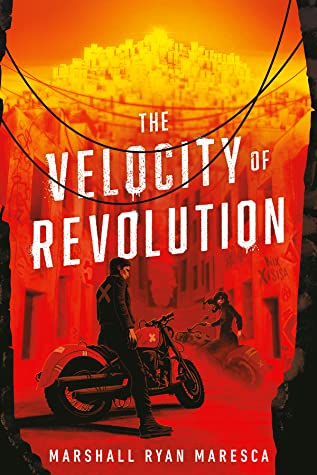
Genres: Queer Protagonists, Science Fantasy, Secondary World Fantasy
Representation: Cast of colour, oppressed minorities, bi/pansexual cast, secondary asexual character, secondary F/F relationship, polyamory
Published on: 9th February 2021
Goodreads

From the author of the Maradaine saga comes a new steampunk fantasy novel that explores a chaotic city on the verge of revolution.
Ziaparr: a city being rebuilt after years of mechanized and magical warfare, the capital of a ravaged nation on the verge of renewal and self-rule. But unrest foments as undercaste cycle gangs raid supply trucks, agitate the populace and vandalize the city. A revolution is brewing in the slums and shantytowns against the occupying government, led by a voice on the radio, connected through forbidden magic.
Wenthi Tungét, a talented cycle rider and a loyal officer in the city patrol, is assigned to infiltrate the cycle gangs. For his mission against the insurgents, Wenthi must use their magic, connecting his mind to Nália, a recently captured rebel, using her knowledge to find his way into the heart of the rebellion.
Wenthi's skill on a cycle makes him valuable to the resistance cell he joins, but he discovers that the magic enhances with speed. Every ride intensifies his connection, drawing him closer to the gang he must betray, and strengthens Nália's presence as she haunts his mind.
Wenthi is torn between justice and duty, and the wrong choice will light a spark in a city on the verge of combustion.
I received this book for free from the publisher via NetGalley in exchange for an honest review. This does not affect my opinion of the book or the content of my review.
Highlights
~everyone uses motorcycles and it is always sexy
~monogamy??? never heard of it
~the mushroom goddess is in the radios
~all the radios
~the most mouthwatering tacos ever
~magic drugs
~when the system breaks you down, break the system
This is, without question, one of the best books of the year.
To start with, this is dieselpunk fantasy, which I don’t run into too often – the magic in Velocity is intimately and powerfully tied to speed, the kind of speed which can only be achieved with the help of an engine, and so everything from motorcycles to trains have their own magical (and arguably spiritual, within the context of the story) significance. And that’s a brilliantly interesting concept all on its own, when so many storytellers choose to pit magic against technology, casting fantasy and science as some kind of enemies; instead, here, they’re intertwined, each a vital half of the whole.
(And for the record? Where ‘steampunk’ is most often used as a descriptor for a specific aesthetic, and as a term has kind of lost any connotations of rebellion-against-the-system, when Velocity calls itself dieselpunk, it means punk. The clue’s in the title: this is a book that is all about questioning and fighting against the system, up to and including tearing it all down to start over. It’s punk as hell.)
The book’s blurb does a pretty good job of summing up the basic story: Wenthi is a police officer, one of the first people with native blood to make the cut. This is probably in large part because his mother is a very important woman, but also helped by the fact that Wenthi completely buys into the status quo, which has his country beggared as all its resources are sent abroad to their ‘allies’, and the population is divided up into a caste system which can be summed up as: the more native blood you have, the lower down you are on the ladder of ‘people who matter’. Wenthi has absolutely drunk the kool-aid, to the point of being freakishly calm and accepting even when he’s mistreated or abused because of his ethnicity. Whoever’s running the propaganda, they’re clearly very good at it.
When his superiors realise that, for whatever reason, Wenthi can slip through the magical warning system used by the rebels – one which means they can always feel the cops coming, and thus always slip through their fingers – he’s sent undercover. With one invaluable resource: a mind-link to an imprisoned rebel that will make his true identity impossible for the rebels to detect.
But honestly, that doesn’t capture even a fraction of the awesomeness that is this story.
Let’s start with the worldbuilding. The book opens with a quick definition of the different castes, and although the words sounded strange to me (as someone who only really has a grip on British English), the terms are normalised so quickly by the narrative that I didn’t have to go back to check the definitions even once. Usually I can’t keep fantasy words straight at all, so kudos to Maresca on that! The system’s pretty simple; as I said above, basically, the more native blood you have, the lower your caste – and the worse your treatment by everyone from law enforcement to the rations office. The country, originally named Ziaparr (also the name of the capital city) was renamed Pinogoz after several rounds of war and colonisation, and the native Zapisians are somewhat Latinx-coded, both in appearance and culturally. Pinogoz is run by the llipe (the highest caste, people who have none or almost no Zapisian blood) and the zoika, who are ‘respected foreigners’ – tourists, and the people who make up the ‘occupational oversight government’. Your caste determines which parts of the city you can access (and how much hassle or outright abuse you can expect at the check-points), the amounts your ration cards are worth…it determines way, way too much, is what I’m saying.
This all sounds reasonably complicated, but honestly, Velocity is so immersive that after the first chapter I had it all down. What’s interesting is that we get three perspectives of the state of the country through the three POV characters; Wenthi, Nália, and Ajiñe, Nália being the rebel who was captured and is now mind-linked to Wenthi, and Ajiñe being another rebel whose cell Wenthi infiltrates. And it’s just…absolutely mind-blowing how all three of them can look at the exact same thing – the city they all live in, people they all interact with, the system that governs it all – and see such different things. I don’t think Velocity would work nearly so well if the reader only got Wenthi’s view, and I don’t think the…the absolute injustice of it all would hit so hard without us getting Nália and Ajiñe’s perspectives. Although Wenthi does, over the course of the book, start to unlearn his brainwashing and internalised racism, getting big chunks of the story through Nália and Ajiñe is invaluable in making the book as great as it is.
Still on the worldbuilding: the biggest thing you need to know about Zapisian culture? Is that they do not have the same view of sex (or romance) that the industrialised West does. Zapisians are hugely sex-positive and often engage in group sex and what we would consider group marriages, and it would be easy to say that they have a very casual approach to sex, but I think that’s misleading. They engage in sex often and easily, but it’s not casual.
“I mean, how can you even think about sex with all of them when you’ll just as soon arrest them? Ezodi.”
“It’s not like that,” he said, bristling at the invective she just used. Bristling because it wasn’t a lie: he was fucking without any spirit. Hollow.
It’s a contemptuous insult, describing someone as a person who ‘fucks without spirit’, and that’s really telling. We can infer, then, that the norm is fucking with spirit, which I think it makes it pretty clear that Zapisians don’t engage in casual, meaningless sex. They have sex a lot, and with people they may not know super well, but it’s never meant to be meaningless. It’s a beautiful and fascinating bit of worldbuilding.
(Also? One of the main secondary characters is asexual, which is something that’s recognised and respected in Zapisian culture. I cannot tell you how ridiculously emotional I got at finally seeing an idealised sexually free culture with space for asexuality!)
But maybe the aspect of the worldbuilding I was most impressed with was everything the main characters didn’t know. As a colonised people, a lot of their history and culture has been taken from them, suppressed or destroyed, and so there’s this quiet thread running through Velocity which is the characters learning about pre-colonisation Ziaparr. In another book, this would be clunky and clumsy, and I’d dismiss it as too much telling-not-showing – but here, Wenthi and the rest of them have to be told. Because they don’t know. And the effect this creates is the feeling that the reader is on this journey with Wenthi and the rest, because they are learning these things just as the reader is learning them. It’s incredibly clever and very intimate; you almost feel like you’re intruding, in some scenes, as though you should slip out quietly and leave the characters to these intensely private, powerful discoveries.
Maresca is one hell of an amazing writer, is what I’m saying.
And gods, this book – Velocity is not your typical revolution fantasy, okay? There’s not just one bad guy who can be killed and then everything will be magically perfect; the story doesn’t skim over or handwave the practical difficulties inherent in overthrowing a system. I’m not sure I’ve ever seen a book tackle the topic this way; fantasy loves idealism, but nothing about the situation Velocity‘s characters are in is idealised, and they know it.
“Let’s say for the sake of argument, the revolution is successful. We reclaim this country. What does that look like? What is justice in that country? What is the law there? Who decides what it looks like and how do we make it fair?”
The deeper Ajiñe’s cell is brought into the rebellion’s ‘inner circle’, the more doubts they have – not about what they’re doing, but about what the end result is supposed to be, supposed to look like. It’s a brutal realism that most ‘fight the system!’ stories don’t go near – because they’re hard, difficult questions, and there’s no magic wand to summon up an easy answer. But Velocity goes there.
And none of that tells you how incredibly compelling this book is; how quickly the writing flows, how impossible it is to put the book down once you start reading. Maresca’s story carries you along like Nália’s treasured motorcycle, and just as the speed makes magic in Nália’s world, Maresca’s writing works its own magic on the reader. It’s all so damn powerful, a river that runs fast but deep. The skill with which Maresca handles Wenthi’s arc is just… I’m in awe. It’s careful and delicate and gradual, and it’s a gods-damn masterpiece.
“Are you afraid they’ll find out what you are?” She came up close to him. “Or are you afraid you’ll find out what you are?”
This is a book with found-family and polyamory, with queerness so casual there aren’t even words for it, with goddesses in the radios and mushrooms that tie minds, hearts, even bodies together. This is a story about colonialism and unlearning internalised racism; about what it means to be cut off from your cultural history and identity, and how to get those things back. It’s about figuring out what a revolution, and its aftermath, would even look like, about the difference between idealism and practice and how to get from one to the other. It’s about magic and empathy and finding something to believe in, and what you’ll do to make it happen.
It’s fucking awesome.
And it’s out on Tuesday. Go preorder your copy immediately.
Now if you’ll excuse me, I have to go and read everything Maresca has ever written ever.
TL;DR: BUY THIS BOOK!
P.S. When you start reading, make sure you have snacks ready. The descriptions of the food will give you cravings. So many cravings.






Oh this is a great review.
I can’t wait to read it.
Thank you! :D I hope you love the book!
[…] this review from Every Book A Doorway […]